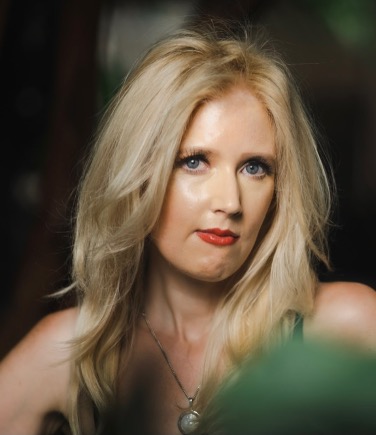Crafting Success: Inside The Film Festival Doctor’s Winning Strategies
by Carole Dean
 Dr. Rebekah Louisa Smith is an award-winning film festival strategist and founder of The Film Festival Doctor. They are committed to securing film festival screenings, winning awards, and earning positive recognition within the film industry for their clients. Currently, Rebekah’s company has helped win more than 2,000 awards for its clients and has supported nearly 850 creatives across the world.
Dr. Rebekah Louisa Smith is an award-winning film festival strategist and founder of The Film Festival Doctor. They are committed to securing film festival screenings, winning awards, and earning positive recognition within the film industry for their clients. Currently, Rebekah’s company has helped win more than 2,000 awards for its clients and has supported nearly 850 creatives across the world.
Rebekah said, “I help filmmakers get their film seen in the right festivals by creating a very streamlined and targeted strategy for their film. Every festival strategy and campaign is bespoke to the film that we’re working with. Nothing’s the same. Every client has different goals and different budgets and different types of films. We create the right kind of plan for each film.”
Filmmakers normally come to me when the film is close to completion or fully completed and they say, look, we’ve made the film, what do we do with it? What festivals do we send it to? How high can we aim? And we solve those problems by finding the right festivals for their film to achieve their key goals.”
Aligning goals with festival selection
Goal setting for your festival run is crucial as it’s important to be in alignment with what you want to achieve and decide if the film can achieve it. The most common goals she discusses with filmmakers are, do you want to get it into Sundance, Slamdance, Cannes, Berlin, Tribeca, all the key festivals? Or do you want to qualify for the Oscars or BAFTA or are you more keen for exposure and networking?
You want to ask yourself, is your film strong enough for the top festivals and awards? If it’s not, there are other festivals that can help you get the film seen and achieve your goals.
This is a very important process. The Film Festival Doctor gives honest feedback based on years of working with festival programmers. They will not say it has potential for top tier festivals if it does not. They give you an excellent constructive critique and explain if the film can potentially achieve the filmmakers’ goals. They take into account if it is possible for Sundance, Tribeca, and Cannes, they do a very detailed plan and timeline. If it’s a no, then you decide if you want to use plan B. If so, they will detail and curate that plan for you.
Personalized festival strategies for every film
Plan B will be festivals a tier below which will still be a good fit for the film. What’s the key goal here? Why do you want to get into those festivals? Most of the time filmmakers want a lot of exposure and access to the right kind of networking. Rebekah wants to get your film seen by people in our industry and your peers.
Setting goals is a priority because I know that I’ve talked to many filmmakers and they have totally different goals. Some of them simply want to promote themselves. Some say they want people to see their film and recognize their talents. Some people want to change belief patterns. Some just want the film to be seen for educational purposes. Some want to find distribution.
Once you have firmed up your goals then Rebekah and her team will “unpack the film.” Let’s pretend it’s a horror short film. The question is, can it break out of the horror genre niche, or will it do better to stay within its niche and thrive on the genre festival circuit?
The benefits are you may meet the right kind of people to build long term relationships with and get the right type of exposure. She really wants you to receive appreciation for the film and win awards. She says, “We give each film a thorough and detailed look.” And the reason is because Rebekah and her colleagues have an excellent background in film festival programming. They bring a fresh pair of eyes to the film. They know what kind of festivals to choose for each one.
Every filmmaker gets this very specific and very targeted outline for their film festival strategy.
Leveraging short films as visual business cards
If the goal is about promotion for themselves like a short film, Rebekah considers this short film as a “business card,” she says it is a “visual business card” showing what they can do as a director, writer, actor, DP, sound, etc. It is showing what the filmmakers can do and can show that with bigger budgets this filmmaker has the talent to make a feature. So, the festivals to go to that can help them achieve that goal of networking and promo in the right way will be festivals that have a large industry presence and a big filmmaker presence. A lot of festivals can be more like local communities, with local audiences that don’t work in the film industry. On the other hand, a lot of them can be very filmmaker focused which is good for connecting with the right kind of people.
Selecting festivals with industry presence and networking opportunities
Rebekah and her team look at different perspectives when they are putting your strategy and list of festivals together. They base decisions on their personal programing tastes from their years of experience curating festivals. They know what films their contacts like and what their individual tastes are. They know what kind of stories these programmers like, what kind of executions they find interesting, and what kinds of themes they like. This is where their knowledge pays off for filmmakers.
Some festivals are heavily focused upon LGBTQI+A. Some on women filmmakers, some on filmmakers which are within the local area of say New York, Miami and LA etc.
Researching previous winners and nominations
Part of the planning process comes from The Film Festival Doctor staff researching what kind of films win at these festivals by looking at the previous winners, nominations, and what kind of categories they have. Obviously, all festivals are different. They don’t have the same kind of awards or the same kind of programming techniques. Their decisions are based upon long-time knowledge and knowing where best to position your film.
Academy Awards submission strategies
To submit to the Academy Awards, there’s two ways you can submit to the Oscars. With a narrative feature, you must do a limited theatrical run release 1 screening for 7 consecutive days, which requires screening your film in theaters that are Oscar approved in one of six U.S. cities (L.A., N.Y., Chicago, Miami, Atlanta, or San Francisco).
For documentary features, live action short films, animation & documentary, you can apply to the Oscars by doing a release theatrically in an Oscar approved theater in one of those cities in the US. Or if you win an Oscar qualifying award at an Oscar qualifying festival, then you can submit. You may need advertising and a PR film to help. Rebekah will advise you on all of this.
Budgeting for festival expenses and The Film Festival Doctor’s services
What are the costs for your festival budget? Festival fees may run from $1,500 to $2,000.00. Rebekah’s services begin at $800.00. She suggests you put $3,000 minimum for your festival expense.
Their strategies are global. They are familiar with all of the key international festivals and can strategize for you all over the world.
I am impressed with her staff’s knowledge. They are living all over the world and specialize in creating film festival strategies. You may want to talk to The Film Festival Doctor and learn more about the possibilities you have to get your film seen on the circuit.
Rebekah says, “I’m proud of all the films I represent. I am proud of every single one of them because they’ve all been seen on the circuit, they’ve all achieved their goals, and everything’s been what they wanted. It is not always a linear journey for results to come in, but they’ve got there in the end.”
Learn more at www.thefilmfestivaldoctor.com
Carole Dean is president and founder of From the Heart Productions; a 501(c)3 non- profit that offers the Roy W. Dean Film Grants and fiscal sponsorship for independent filmmakers.
profit that offers the Roy W. Dean Film Grants and fiscal sponsorship for independent filmmakers.
She is creator and instructor of Learn Producing: The Ultimate Course for Indie Film Production. 26 classes which will teach indie filmmakers how to produce their films.
She hosts the weekly podcast, The Art of Film Funding, interviewing those involved in all aspects of indie film production. She is also the author of The Art of Film Funding, 2nd Edition: Alternative Financing Concepts. See IMDB for producing credits

